Earth: The Biography Blu-ray Movie
HomeEarth: The Biography Blu-ray Movie 
BBC | 2007 | 230 min | Not rated | Jul 22, 2008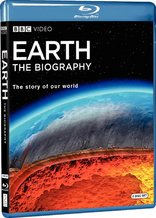
Movie rating
7.7 | / 10 |
Blu-ray rating
| Users | 4.2 | |
| Reviewer | 4.0 | |
| Overall | 4.0 |
Overview
Earth: The Biography (2007)
Earth: The Biography highlights the major events which have shaped the Earth's history and allowed life to flourish. Presented by Dr Iain Stewart, each episode will reveal a different force critical to the development of Earth including volcanoes, the ocean, the atmosphere and ice. The series follows Dr Stewart's personal journey to some of the most remote places on the planet, from abseiling down into a lava lake in Ethiopia to cave diving in the underwater caverns left by the impact of the meteorite that wiped out the dinosaurs. He will discover how volcanoes saved the planet, how a rainstorm lasted for thousands of years, and how the Mediterranean Sea once dried up. Each individual film highlights the delicate balance of life on Earth, and how its incredible history has been the story of disaster and recovery.
| Documentary | Uncertain |
| Nature | Uncertain |
Specifications
Video
Video codec: VC-1
Video resolution: 1080i
Aspect ratio: 1.78:1
Audio
English: DTS-HD 5.1
Subtitles
English
Discs
25GB Blu-ray Disc
Two-disc set (2 BDs)
Playback
Region free
Review
Rating summary
| Movie | 4.5 | |
| Video | 3.5 | |
| Audio | 3.0 | |
| Extras | 0.0 | |
| Overall | 4.0 |
Earth: The Biography Blu-ray Movie Review
Reviewed by Lindsay Mayer July 21, 2008At times it truly amazes me just how many critical elements of our existence are taken for granted on a daily basis. The vast majority of humanity finds itself concerned with such trifling human issues that hardly a soul pauses to reflect on the glory of the "mundane." The ripple effects that occur with the smallest of beginnings; given enough time, even the most humble collection of molecules yields something spectacular.
This marvelous series shows us just how spectacular. Titled Earth: The Biography, it is best described as the geological cousin of the breathtaking BBC documentary Planet Earth. Just as epic in scope, Biography focuses on the less glamorous aspects of life on Earth - that is, the nonliving part of it. This series is less about the planet's biodiversity than it is about the rocks and the weather, the fire and the ice. The forces that have shaped our vast blue marble into what it is today. These same forces, of course, continue - heedless of human plight, they will sculpt the land, the air, and the oceans for millions of years to come.
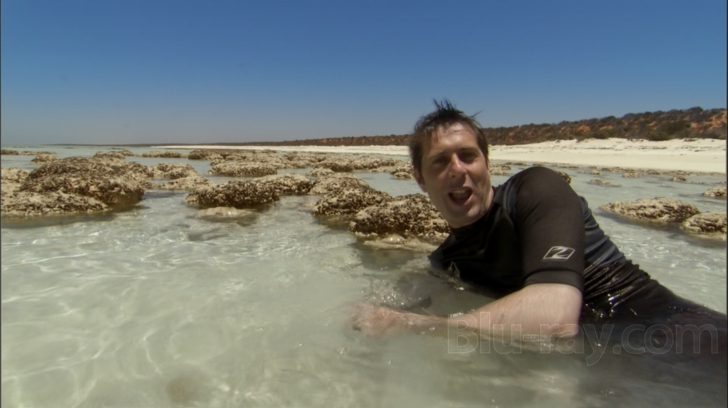
Dr. Iain Stewart goes swimming in Australia with columns of stromatolites - the oldest and most ancient lifeforms in the world.
Another intriguing production from the British Broadcasting Company, Earth: The Biography is composed of five 45-minute episodes: "Volcanoes," "Atmosphere," Ice," "Oceans," and "Rare Planet." The series is hosted by Dr. Iain Stewart, a lively Scottish geologist that lends real character to the narration and exposition of the show. Aided by a healthy amount of CG effects and animated sequences, Stewart illuminates the little-regarded continuous processes our planet undergoes every day. The reason these cycles are all but ignored by most is due to their time frame. The Earth's geologic activities occur on a scale that not only transcends one individual's lifetime, but the consecutive lifetimes of thousands. "Geologic time" is measured in millions of years, because that is exactly how long it takes to see significant physical change in the shape of the surface geography. Mountains rise and fall, oceans are formed, and the land ebbs and flows like a slow tide, changing at the whims of the fire beneath it.
Through these element-themed episodes, Stewart takes the viewer back billions of years to the Earth's formation, its gradual cooling and acquisition of water, and the breakthrough of carbon-based lifeforms, after a geological spell. "Volcanoes" documents important processes to which these fiery mountains contribute; particularly the vital cycle of billowing millions of tons of carbon dioxide into the atmosphere after it is trapped by primitive organisms like phytoplankton and accumulates on the sea floor. Subduction volcanoes collect the substance over time, eventually spewing it back to the surface to begin the cycle anew. "Atmosphere" is primarily about the effects of air and wind, though it contains a good portion of information on weather systems, as well. "Ice" shows the viewer just how integral a substance all that frozen water has been in the planet's past, as well as the present ice age under which most of human history has taken place. It is even theorized that the rapid cooling of the planet was a significant factor in our accelerated evolution, favoring only the most clever and adaptable in a tumultuous climate. In the fourth episode, "Oceans," Stewart explains the origins and importance of the world's marine systems, and the interconnected loop of ocean currents that effects weather and climates across the planet.
Throughout each installment in the series, Stewart takes relevant issues - global climate change in "Atmosphere," for example - and presents them in a fashion not typically seen in discussions about environmental destruction. In essence, he does not take up the mantra of "Save the Earth," but rather "Save the Humans." This is true in every extent - the very nature of the Earth makes it a survivor. It is a highly adaptable system that will cleanse itself over anything we could possibly throw at it. The planet has gone through much worse in its 4 billion year history. What Stewart presents in the series' ultimate episode is the fairly recent "rare planet" theory; that our living world, with its complex systems and levels of biodiversity, may be a more unusual occurrence than we are led to think. Despite the billions of solar systems in the universe, it is not known how many planets actually have life on them, to a scale comparable with our own. Stewart then argues that if this theory is true, we as a species must show a deeper appreciation for our home, as it's truly the only one we've got.
Biography is a fascinating spectacle; Stewart travels far and wide in order to present fascinating geologic phenomena for our viewing pleasure. The related environmental issues discussed truly lead one to wonder what will become of the human race on a whole. Will our greed and shortsightedness destroy us? It is still not too late to change our current wasteful path of existence; the question is... do we have the collective will to do it, if ever?
Earth: The Biography Blu-ray Movie, Video Quality 
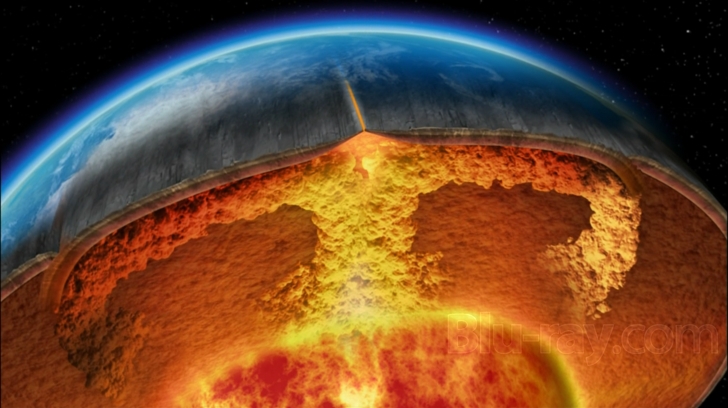
Encoded in VC-1, Biography's 1080i picture averages around 15 Mbps. Much of the BBC camerawork, especially its signature close-up shots, look stunning on this Blu-ray release. On the opposite scale, even the satellite imagery is beautiful. Colors are rich and true to life, blacks and whites show good contrast with no noticeable crush or blooming, and no annoying artifacts like edge enhancement or macroblocking are apparent.
As with most contemporary documentaries, there is a reliance on CG embellishments and stock footage to illustrate points. For the subject matter, it is useful - although for picture quality, it takes the feature down a notch. The softness of the CG sequences and the low resolution of video work for media outlets makes for a stark contrast with the series' high definition filming. Though not nearly as bad as a title like Six Degrees Could Change the World, it's still a bit of an annoyance. Moreover, Biography is unfortunately another "smoothie" title, with a low bitrate, interlaced VC-1 encoding utilized. Host Iain Stewart enjoys a good amount of close-ups throughout, though he doesn't seem to have any skin pores... All around, it's simply another case of "what could this have looked like?" given the higher-bitrate 1080p treatment. Whether noise reduction technology was implemented on this TV series or not, it still is somewhat a grievance.
Earth: The Biography Blu-ray Movie, Audio Quality 
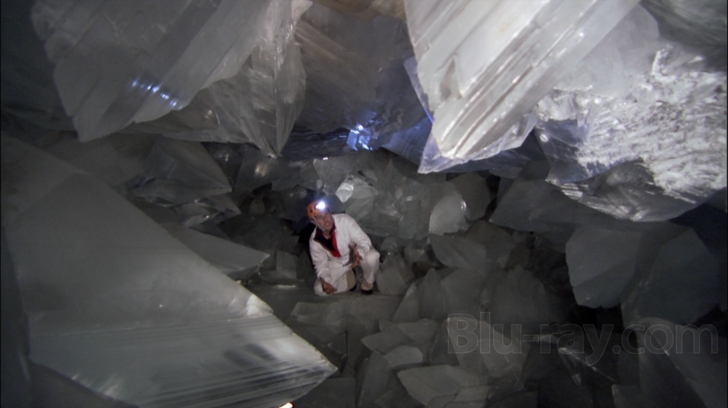
Biography's sole audio offering is English DTS-HD HR 5.1, with optional English SDH captioning. Even with the series' flashy editing and raptly narrated content, it is still a documentary, primarily aimed to educate rather than entertain. As such, the DTS-HD track is quite nice, but mostly composed of Stewart's narration in the center channel. Ambient effects are somewhat present in the surround channels, although much seems to consist of foley effects for simulated geologic sequences. The LFE channel is put to good use for the ubiquitous rumbling of natural disasters and the like, but overall this title's sound mix will hardly "wow" the viewer. It is adequate for the subject matter, as stated before.
Earth: The Biography Blu-ray Movie, Special Features and Extras 
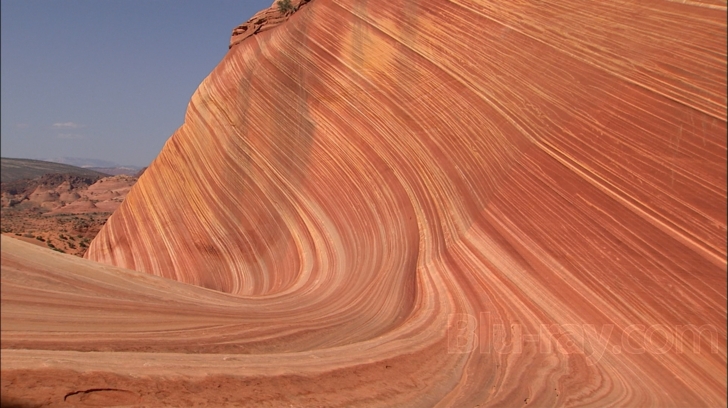
There are no extra features provided on this release.
Earth: The Biography Blu-ray Movie, Overall Score and Recommendation 
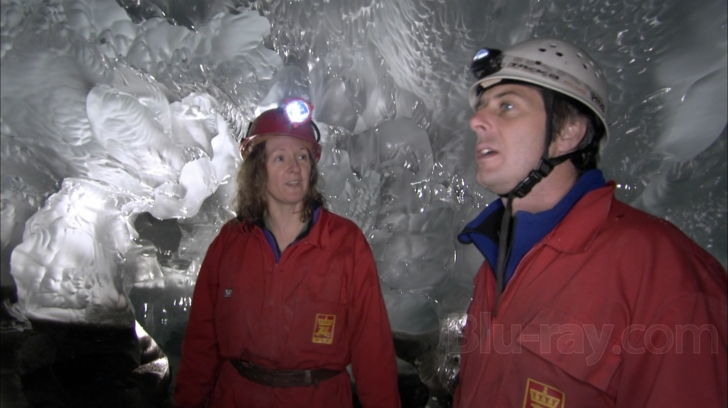
One would find it rather surprising how fascinating a supposedly "mundane" subject can really be. The field of geology is in fact an interesting one, showing how very alive and active the forces of our planet are - one just has to see it on a different scale of time. Earth: The Biography helps to illustrate these forces in both an entertaining and educational manner. The series mesmerizes with its imagery and muses with its rhetoric. It shows beyond the shadow of a doubt that our planet is incredibly adaptable and forgiving. Given enough time, the interconnected systems of the Earth will correct themselves and continue inexorably onward. As mentioned before, the issue is not about "saving" the planet - she can take care of herself. It's about our role as a species and a steward of life on the world we know. Whether we will see fit to sustain a healthy environment for our own well-being is an enormous and unpredictable variable, and it governs our future with a heavy hand. Humans have more than enough awareness to engender a collective will to change, though it seems the collective discipline to enact it is lacking. Our descendants deserve better.
Similar titles
Similar titles you might also like

Wild China
2008

Galápagos
2006

Planet Earth
The Complete Series
2006

Ganges
2007

The Universe: The Complete Season Seven
Ancient Mysteries Solved
2013

Nature's Most Amazing Events
2009

Life
BBC / Narrated by David Attenborough
2009

Baraka
1992

Wonders of the Solar System
2010

Wild Pacific
2008

Human Planet: The Complete Series
BBC
2011

Shark Week: The Great Bites Collection
2008

Yellowstone: Battle for Life
2009

Earth - The Power of the Planet [BBC DVD]
2007

Grand Canyon Adventure: River at Risk 3D
IMAX 3D
2008

The Great Rift
2009

Chronos
IMAX
1985

HOME
2009

Africa
2013

Wonders of the Universe
BBC
2011